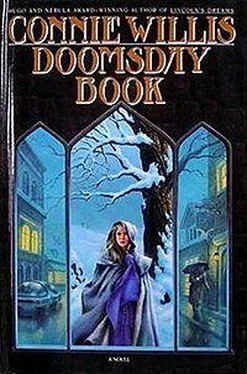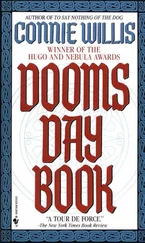She cut the rope free and sliced it into shorter sections, threw down the knife and went out to the donkey. He was trying to gnaw a hole in the sack of oats. She tied it and the other bags to his back with the pieces of rope and led him out of the courtyard and across the green to the church.
Roche was nowhere in sight. Kivrin still needed to fetch the blankets and the candles, but she wanted to put the sacraments in the panniers first. Food, oats, blankets, candles. What else had she forgotten?
Roche appeared at the door. He was not carrying anything.
"Where are the sacraments?" she called to him.
He didn't answer. He leaned for a moment against the church door, staring at her, and the look on his face was the same as when he had come to tell her about the miller. But they've all died, she thought, there's nobody left to die.
"I must ring the bell," he said and started across the churchyard toward the belltower.
"There's no time to ring the funeral toll," she said. "We must start for Scotland." She tied the donkey to the gate, her cold fingers fumbling with the rough rope, and hurried after him, catching him by the sleeve. "What is it?"
He turned, almost violently, toward her, and the expression on his face frightened her. He looked like a cutthroat, a murderer. "I must ring the bell for vespers," he said and shook himself violently free of her hand.
Oh, no, Kivrin thought.
"It is only midday," she said. "It isn't time for vespers yet." He's just tired, she thought. We're both so tired we can't think straight. She took hold of his sleeve again. "Come, Father. We must go if we're to get through the woods by nightfall."
"It is past time," he said, "and I have not yet rung them. Lady Imeyne will be angry."
Oh, no, she thought, oh no oh no.
"I will ring it," she said, stepping in front of him to stop him. "You must go into the house and rest."
"It grows dark," he said angrily. He opened his mouth as if to shout at her, and a great gout of vomit and blood heaved up out of him and onto Kivrin's jerkin.
Oh no oh no oh no.
He looked bewilderedly at her drenched jerkin, the violence gone out of his face.
"Come, you must lie down," she said, thinking, we will never make it to the manor house.
"Am I ill?" he said, still staring at her blood-drenched jerkin.
"No," she said. "You are but tired and must rest."
She led him toward the church. He stumbled, and she thought, if he falls, I will never get him up. She helped him inside, bracing the heavy door open with her back, and sat him down against the wall.
"I fear the work has tired me," he said, leaning his head against the stones. "I would sleep a little."
"Yes, sleep," Kivrin said. As soon as he had closed his eyes she ran back to the manor house for blankets and a bolster to make him a pallet. When she skidded in with them, he was no longer there.
"Roche!" she cried, trying to see up the dark nave. "Where are you?"
There was no answer. She darted out again, still clutching the bedding to her chest, but he wasn't in the bell tower or the churchyard, and he could not possibly have made it to the house. She ran back in the church and up the nave and he was there, on his knees in front of the statue of St. Catherine.
"You must lie down," she said, spreading the blankets on the floor.
He lay down obediently, and she put the bolster behind his head. "It is the bubonic plague, is it not?" he asked, looking up at her.
"No," she said, pulling the coverlet up over him. "You're tired, that's all. Try to sleep."
He turned on his side, away from her, but in a few minutes he sat up, the murderous expression back, and threw the covers off. "I must ring the vespers bell," he said accusingly, and it was all Kivrin could to to keep him from standing up. When he dozed again, she tore strips from the frayed bottom of her jerkin and tied his hands to the rood screen.
"Don't do this to him," Kivrin murmured over and over without knowing it. "Please! Please! Don't do this to him."
He opened his eyes. "Surely God must hear such fervent prayers," he said, and sank into a deeper, quieter sleep.
Kivrin ran out and unloaded the donkey and untied him, gathered up the sacks of food and the lantern and brought them inside the church. He was still sleeping. She crept out again and ran across to the courtyard and drew a bucket of water from the well.
He still did not appear to have wakened, but when Kivrin wrung out a strip torn from the altar cloth and bathed his forehead with it, he said, without opening his eyes, "I feared that you had gone."
She wiped the crusted blood by his mouth. "I would not go to Scotland without you."
"Not Scotland," he said. "To Heaven."
She ate a little of the stale manchet and cheese from the food sack and tried to sleep a little, but it was too cold. When Roche turned and sighed in his sleep, she could see his breath.
She built a fire, pulling up the stick fence around one of the huts and piling the sticks in front of the rood screen, but it filled the church with smoke, even with the doors propped open. Roche coughed and vomited again. This time it was nearly all blood. She put the fire out and made two more hurried trips for as many furs and blankets as she could find and made a sort of nest of them.
Roche's fever went up in the night. He kicked at the covers and raged at Kivrin, mostly in words she couldn't understand, though once he said, clearly, " Go , curse you!" and over and over, furiously, "It grows dark!"
Kivrin brought the candles from the altar and the top of the rood screen and set them in front of St. Catherine's statue. When his ravings about the dark got bad, she lit them all and covered him up again, and it seemed to help a little.
His fever rose higher, and his teeth chattered in spite of the rugs heaped over him. It seemed to Kivrin that his skin was already darkening, the blood vessels hemorrhaging under the skin. Don't do this. Please.
In the morning he was better. His skin had not blackened after all; it was only the uncertain light of the candles that had made it seem mottled. His fever had come down a little and he slept soundly through the morning and most of the afternoon, not vomiting at all. She went out for more water before it got dark.
Some people recovered spontaneously and some were saved by prayers. Not everyone died who was infected. The death rate for pneumonic plague was only ninety per cent.
He was awake when she went in, lying in a shaft of smoky light. She knelt and held a cup of water under his mouth, tilting his head up so he could drink.
"It is the blue sickness," he said when she let his head back down.
"You're not going to die," she said. Ninety per cent. Ninety per cent.
"You must hear my confession."
No. He could not die. She would be left here all alone. She shook her head, unable to speak.
"Bless me, Father, for I have sinned," he began in Latin.
He hadn't sinned. He had tended the sick, shriven the dying, buried the dead. It was God who should have to beg forgiveness.
" — in thought, word, deed, and omission. I was angry with Lady Imeyne. I shouted at Maisry." He swallowed. "I had carnal thoughts of a saint of the Lord."
Carnal thoughts.
"I humbly ask pardon of God, and absolution of you, Father, if you think me worthy."
There is nothing to forgive, she wanted to say. Your sins are no sins. Carnal thoughts. We held down Rosemund and barricaded the village against a harmless boy and buried a six- month-old baby. It is the end of the world. Surely you are to be allowed a few carnal thoughts.
She raised her hand helplessly, unable to speak the words of absolution, but he did not seem to notice. "Oh, My God," he said, "I am heartily sorry for having offended Thee."
Читать дальше












